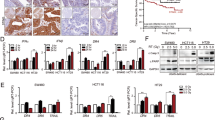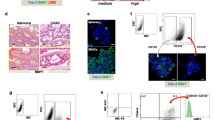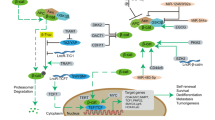Abstract
Tumor-integrating multipotent mesenchymal stromal cells (MSC) expressing transgenes with anti-tumor activity may serve as vehicles for tumor therapy. Tumor necrosis factor-related apoptosis-inducing ligand (TRAIL) represents such a factor; however, TRAIL-resistant tumor cells exist. Based on our previous work, here we investigated whether MSC with lentiviral TRAIL expression (TRAIL-MSC) inhibit the growth of TRAIL-resistant colorectal carcinoma (CRC) cells. Our data show that TRAIL-MSC induce apoptosis in selected TRAIL-resistant CRC cell lines and effectively inhibit the growth of TRAIL-resistant HCT8 cells. This sensitization to TRAIL-induced apoptosis required the presence of MSC-expressed TRAIL. However, for the first time we show that selected CRC cells are resistant to TRAIL-MSC. In the cell line HT29, this resistance could be overcome by concomitant subapoptotic genotoxic damage in vitro. However, such sensitization was not achieved in vivo as treatment of mixed HT29/TRAIL-MSC xenografts with 5-FU rather resulted in enhanced growth. Taken together, our data prove that TRAIL-MSC overcome TRAIL resistance in selected CRC cells through direct intercellular interaction and may, therefore, represent a clinical tool to overcome TRAIL resistance. However, such potential clinical use requires further preclinical studies as our data also prove that TRAIL-MSC-resistant CRC cells exist. Our data add to the notion that TRAIL resistance of CRC cells is conferred by different mechanisms.
This is a preview of subscription content, access via your institution
Access options
Subscribe to this journal
Receive 12 print issues and online access
$259.00 per year
only $21.58 per issue
Buy this article
- Purchase on Springer Link
- Instant access to full article PDF
Prices may be subject to local taxes which are calculated during checkout






Similar content being viewed by others
References
Studeny M, Marini FC, Dembinski JL, Zompetta C, Cabreira-Hansen M, Bekele BN et al. Mesenchymal stem cells: potential precursors for tumor stroma and targeted-delivery vehicles for anticancer agents. J Natl Cancer Inst 2004; 96: 1593–1603.
Kumar S, Chanda D, Ponnazhagan S . Therapeutic potential of genetically modified mesenchymal stem cells. Gene Ther 2008; 15: 711–715.
Ashkenazi A . Targeting the extrinsic apoptosis pathway in cancer. Cytokine Growth Factor Rev 2008; 19: 325–331.
Wang S . The promise of cancer therapeutics targeting the TNF-related apoptosis-inducing ligand and TRAIL receptor pathway. Oncogene 2008; 27: 6207–6215.
Center MM, Jemal A, Smith RA, Ward E . Worldwide variations in colorectal cancer. CA Cancer J Clin 2009; 59: 366–378.
Walther A, Johnstone E, Swanton C, Midgley R, Tomlinson I, Kerr D . Genetic prognostic and predictive markers in colorectal cancer. Nat Rev Cancer 2009; 9: 489–499.
Luetzkendorf J, Mueller LP, Mueller T, Caysa H, Nerger K, Schmoll HJ . Growth-inhibition of colorectal carcinoma by lentiviral TRAIL-transgenic human mesenchymal stem cells requires their substantial intratumoral presence. J Cell Mol Med 2010; 14: 2292–2304.
Tillman DM, Izeradjene K, Szucs KS, Douglas L, Houghton JA . Rottlerin sensitizes colon carcinoma cells to tumor necrosis factor-related apoptosis-inducing ligand-induced apoptosis via uncoupling of the mitochondria independent of protein kinase C. Cancer Res 2003; 63: 5118–5125.
Nawrocki ST, Carew JS, Douglas L, Cleveland JL, Humphreys R, Houghton JA . Histone deacetylase inhibitors enhance lexatumumab-induced apoptosis via a p21Cip1-dependent decrease in survivin levels. Cancer Res 2007; 67: 6987–6994.
Drosopoulos KG, Roberts ML, Cermak L, Sasazuki T, Shirasawa S, Andera L et al. Transformation by oncogenic RAS sensitizes human colon cells to TRAIL-induced apoptosis by up-regulating death receptor 4 and death receptor 5 through a MEK-dependent pathway. J Biol Chem 2005; 280: 22856–22867.
Luo JL, Maeda S, Hsu LC, Yagita H, Karin M . Inhibition of NF-kappaB in cancer cells converts inflammation-induced tumor growth mediated by TNFalpha to TRAIL-mediated tumor regression. Cancer Cell 2004; 6: 297–305.
Toscano F, Fajoui ZE, Gay F, Lalaoui N, Parmentier B, Chayvialle JA et al. P53-mediated upregulation of DcR1 impairs oxaliplatin/TRAIL-induced synergistic anti-tumour potential in colon cancer cells. Oncogene 2008; 27: 4161–4171.
Skehan P, Storeng R, Scudiero D, Monks A, McMahon J, Vistica D et al. New colorimetric cytotoxicity assay for anticancer-drug screening. J Natl Cancer Inst 1990; 82: 1107–1112.
Dull T, Zufferey R, Kelly M, Mandel RJ, Nguyen M, Trono D et al. A third-generation lentivirus vector with a conditional packaging system. J Virol 1998; 72: 8463–8471.
Mueller LP, Luetzkendorf J, Mueller T, Reichelt K, Simon H, Schmoll HJ . Presence of mesenchymal stem cells in human bone marrow after exposure to chemotherapy: evidence of resistance to apoptosis induction. Stem Cells 2006; 24: 2753–2765.
Terret C, Erdociain E, Guimbaud R, Boisdron-Celle M, McLeod HL, Fety-Deporte R et al. Dose and time dependencies of 5-fluorouracil pharmacokinetics. Clin Pharmacol Ther 2000; 68: 270–279.
Levi F, Metzger G, Massari C, Milano G . Oxaliplatin: pharmacokinetics and chronopharmacological aspects. Clin Pharmacokinet 2000; 38: 1–21.
Zhu H, Zhang L, Huang X, Davis JJ, Jacob DA, Teraishi F et al. Overcoming acquired resistance to TRAIL by chemotherapeutic agents and calpain inhibitor I through distinct mechanisms. Mol Ther 2004; 9: 666–673.
Malhi H, Gores GJ . TRAIL resistance results in cancer progression: a TRAIL to perdition? Oncogene 2006; 25: 7333–7335.
Trauzold A, Siegmund D, Schniewind B, Sipos B, Egberts J, Zorenkov D et al. TRAIL promotes metastasis of human pancreatic ductal adenocarcinoma. Oncogene 2006; 25: 7434–7439.
Ehrhardt H, Fulda S, Schmid I, Hiscott J, Debatin KM, Jeremias I . TRAIL induced survival and proliferation in cancer cells resistant towards TRAIL-induced apoptosis mediated by NF-kappaB. Oncogene 2003; 22: 3842–3852.
Williams AC, Smartt H, AM HZ, Macfarlane M, Paraskeva C, Collard TJ . Insulin-like growth factor binding protein 3 (IGFBP-3) potentiates TRAIL-induced apoptosis of human colorectal carcinoma cells through inhibition of NF-kappaB. Cell Death Differ 2007; 14: 137–145.
Baader E, Toloczko A, Fuchs U, Schmid I, Beltinger C, Ehrhardt H et al. Tumor necrosis factor-related apoptosis-inducing ligand-mediated proliferation of tumor cells with receptor-proximal apoptosis defects. Cancer Res 2005; 65: 7888–7895.
Plantivaux A, Szegezdi E, Samali A, Egan L . Is there a role for nuclear factor kappaB in tumor necrosis factor-related apoptosis-inducing ligand resistance? Ann N Y Acad Sci 2009; 1171: 38–49.
Spencer SL, Gaudet S, Albeck JG, Burke JM, Sorger PK . Non-genetic origins of cell-to-cell variability in TRAIL-induced apoptosis. Nature 2009; 459: 428–432.
Studeny M, Marini FC, Champlin RE, Zompetta C, Fidler IJ, Andreeff M . Bone marrow-derived mesenchymal stem cells as vehicles for interferon-beta delivery into tumors. Cancer Res 2002; 62: 3603–3608.
Kucerova L, Altanerova V, Matuskova M, Tyciakova S, Altaner C . Adipose tissue-derived human mesenchymal stem cells mediated prodrug cancer gene therapy. Cancer Res 2007; 67: 6304–6313.
Acknowledgements
We are grateful to the donors who consented the use of their bone marrow aspirates. We thank Professor Dr K Maeder, Institute of Pharmacy, Martin-Luther-University Halle-Wittenberg for the non-invasive in vivo multispectral fluorescence imaging. The study was supported in part by grants from the Federal State of Saxonia-Anhalt and the German Ministry of Education and Research through the Wilhelm-Roux-Program at the Medical Faculty of the Martin-Luther-University Halle-Wittenberg (NBL-3 program 1/09, 3/15, 6/08, 3/27) as well by a grant from the Federal State of Saxonia-Anhalt (FKZ: 3646A/0907).
Author contributions: LPM, JL and TM designed the study; LPM, JL, MW, KN, HC and TM performed the research; LPM, JL, HC and TM controlled and analyzed data; LPM, JL and TM wrote the paper.
Author information
Authors and Affiliations
Corresponding author
Ethics declarations
Competing interests
Dr LP Mueller, J Luetzkendorf and Dr T Mueller have filed a patent on the lentiviral TRAIL-MSC described in this report. All other authors, M Widder, K Nerger and H Caysa, have no conflict of interest to declare.
Additional information
Supplementary Information accompanies the paper on Cancer Gene Therapy website
Supplementary information
Rights and permissions
About this article
Cite this article
Mueller, L., Luetzkendorf, J., Widder, M. et al. TRAIL-transduced multipotent mesenchymal stromal cells (TRAIL-MSC) overcome TRAIL resistance in selected CRC cell lines in vitro and in vivo. Cancer Gene Ther 18, 229–239 (2011). https://doi.org/10.1038/cgt.2010.68
Received:
Revised:
Accepted:
Published:
Issue Date:
DOI: https://doi.org/10.1038/cgt.2010.68
Keywords
This article is cited by
-
Targeting the tumor stroma for cancer therapy
Molecular Cancer (2022)
-
Mesenchymal stem/stromal cells in cancer therapy
Journal of Hematology & Oncology (2021)
-
Stem Cell as Vehicles of Antibody in Treatment of Lymphoma: a Novel and Potential Targeted Therapy
Stem Cell Reviews and Reports (2021)
-
Antitumor effects of TRAIL-expressing mesenchymal stromal cells in a mouse xenograft model of human mesothelioma
Cancer Gene Therapy (2015)



